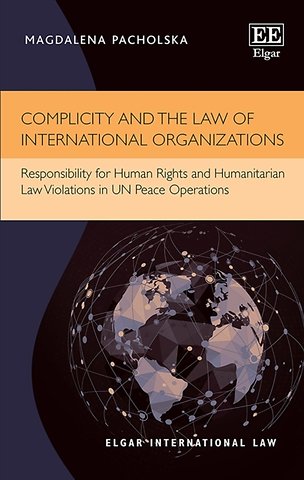Complicity and the Law of International Organizations
Responsibility for Human Rights and Humanitarian Law Violations in UN Peace Operations
Gebonden Engels 2020 1e druk 9781839101359Samenvatting
This timely book examines the responsibility of international organizations for complicity in human rights and humanitarian law violations. It comprehensively addresses a lacuna in current scholarship through an analysis of the mandates and modus operandi of UN peace operations, offering workable normative solutions and striking a balance between the UN's duty not to contribute to international law violations and its need to discharge mandated tasks in a highly volatile environment. Building on existing scholarship on State responsibility for aid or assistance, this incisive book is the first to focus on how the complicity of international organizations in human rights and humanitarian law violations can be established.
Through a re-examination of classic legal notions such as due diligence and effective control, and their application to the problem of UN responsibility for complicity, Dr Magdalena Pacholska provides a pertinent analysis of the complex issues surrounding the UN's legal exposure for its activities in the field of peace and security. Legal advisers working for the UN and other international organizations, national Ministries of Defence, and courts with jurisdiction in this area, will find this book's insights both valuable and useful in practice. It will also be of interest to scholars and employees of NGOs with a focus on international humanitarian law and the accountability of international organizations.
Trefwoorden
vn vredesoperaties internationaal recht medeplichtigheid juridische verantwoordelijkheid internationale organisaties mensenrechten humanitair recht due diligence aansprakelijkheid peacekeeping juridische theorie verantwoordingsplicht effectieve controle preventie attributie internationale betrekkingen rechtsstaat veiligheid compliance governance rechtspraak
Trefwoorden
Specificaties
Lezersrecensies
Inhoudsopgave
U kunt van deze inhoudsopgave een PDF downloaden
Abbreviations x
1 Introduction 1
1.A Research question 4
1.B Research design 5
1.C Methodology 6
1.D Clarifications and limitations 9
2 From impartiality to complicity? The evolution of UN peace operations 11
2.A Preliminary remarks 12
2.A.1 UN Peacekeeping: Conception and Legal Framework under the UN Charter 12
2.A.2 Overview of Command and Control Arrangements 18
2.B The evolution of UN peace operations 21
2.B.1 Traditional Peacekeeping 23
2.B.2 Post-Cold War Multidimensional Peace Operations 24
2.B.3 Rwanda, Srebrenica, and other Contemporary Failures 28
2.B.4 The Birth of Robust Peacekeeping 33
2.C The demise of impartiality 35
2.D Conclusions and typology of potential complicity scenarios 41
3 Legal regime of the responsibility of international organizations 42
3.A International legal personality of international organizations 43
3.B Main points of criticism leveled against ARIO 47
3.B.1 Extensive Borrowing from Articles on Responsibility of States 48
3.B.2 Scarce Practice and (Dis)regard to the Principle of Speciality 49
3.B.3 Distinction between Primary and Secondary Rules 51
3.C Key principles of ARIO 52
3.C.1 Breach of an International Obligation by an IO 54
3.C.2 Rules of Attribution 61
3.C.3 The Concept of Derivative Responsibility 69
3.C.4 Tentative Conclusions on ARIO 70
3.D Challenges of enforcing the UN’s responsibility 71
4 Responsibility for complicity in public international law 78
4.A Complicity in public international law: an analytical framework 79
4.A.1 Sui Generis Meaning of Complicity in the Law of International Responsibility 82
4.A.2 Survey of Subject-specific Complicity Norms in the Era of Collective Security 90
4.B Responsibility for aid or assistance under ARS and ARIO 92
4.B.1 General Complicity Rule 93
4.B.2 Obligation of Non-assistance 112
4.B.3 Conclusions on Responsibility for Aiding or Assisting in ARS and ARIO 127
4.C A case for the aggravated complicity rule 129
4.C.1 Systemic Integration of the Aggravated Complicity Rule 132
4.C.2 Normative Environment: The Deductive Approach 135
4.C.3 Analysis of State/IO Practice and Opinio Juris: The Inductive Method 151
4.C.4 Conclusions on the Aggravated Complicity Rule 163
5 Due diligence and responsibility for complicity: the quest for clarification 168
5.A Due diligence in public international law: an overview 169
5.A.1 Preliminary Remarks 169
5.A.2 Evolution of the Notion of Due Diligence 172
5.A.3 Analytical Clarifications 177
5.B No harm rule versus general complicity rule 179
5.B.1 Relevance of the No Harm Rule in the Realm of IO Responsibility 180
5.B.2 Complicity and No Harm Rule: A Conceptual Demarcation 181
5.B.3 Tentative Conclusions 189
5.C The standard of due diligence and the aggravated complicity rule 190
5.C.1 Treaty-based Obligations to Prevent: A More Manageable Alternative to the Aggravated Complicity Rule? 190
5.C.2 Taking Acceptance Seriously: Rationale for Augmenting the International Legal System with the Aggravated Complicity Rule 194
5.C.3 Incorporation of Due Diligence Standard into Aggravated Complicity Rule 199
5.D Conclusions 206
6 Responsibility for complicity and the plurality of responsible actors 209
6.A Plurality of responsible actors: contemporary state of art 210
6.A.1 Analytical Toolbox 211
6.A.2 Refining the Question: Responsibility for ‘Joint Complicity’ 215
6.B Allocation of responsibility for joint complicity 217
6.B.1 Evolving Modalities of the Effective Control Test 217
6.B.2 Proposed Scheme of Responsibility for the UN Peacekeepers’ Complicit Conduct 226
6.C The implementation of dual responsibility of the UN and TCC for peacekeepers’ complicit conduct 238
6.C.1 Invocation of Responsibility 238
6.C.2 Consequences of the Responsibility for Aid or Assistance 242
6.D Concluding remarks 248
7 General conclusions 249
7.A Results 249
7.B Discussion and Conclusions 254
Index 258
Anderen die dit boek kochten, kochten ook
Rubrieken
- advisering
- algemeen management
- coaching en trainen
- communicatie en media
- economie
- financieel management
- inkoop en logistiek
- internet en social media
- it-management / ict
- juridisch
- leiderschap
- marketing
- mens en maatschappij
- non-profit
- ondernemen
- organisatiekunde
- personal finance
- personeelsmanagement
- persoonlijke effectiviteit
- projectmanagement
- psychologie
- reclame en verkoop
- strategisch management
- verandermanagement
- werk en loopbaan







